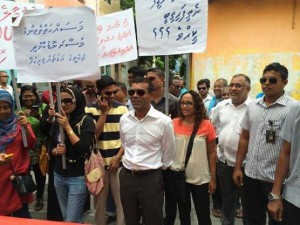Minister of Environment and Energy Thoriq Ibrahim signed for the ruling Progressive Party of Maldives (PPM) today.
Thoriq had been filling a slot assigned for the Jumhooree Party (JP) under the coalition agreement formed with the PPM during last year’s presidential election.
Following the dissolution of the coalition agreement between the JP and PPM last week, nine political appointees belonging to the JP – including Transport Minister Ameen Ibrahim – were dismissed by President Abdulla Yameen, prompting speculation in the media that the three ministers remaining in JP slots would join the ruling party to retain their posts.
Speaking to press after signing his membership form at a ceremony in Muleeage this afternoon, Thoriq said he decided to sign for the PPM to complete the work begun by his ministry after the current administration took office in November last year.
The environment minister assured the public that he would “sincerely” remain behind President Yameen for the next five years and endeavour to develop the country.
Thoriq also denied coming under “any kind of pressure” to sign for the ruling party in the wake of the coalition’s breakup.
In his remarks at the ceremony, President Abdulla Yameen meanwhile praised Thoriq as an “active” and “resourceful person,” welcoming the minister to the party on behalf of PPM Leader Maumoon Abdul Gayoom, the party’s council, parliamentary group and members.
“Welcome to the team. God willing, we are beginning a long-haul journey so welcome aboard,” he said.
Aside from Thoriq, Home Minister Umar Naseer and Economic Development Minister Mohamed Saeed were also appointed to the cabinet as JP political appointees. The pair have however yet to sign for the PPM.
The PPM severed its coalition agreement with the JP following a dispute over the speaker’s post, which was contested by JP Leader Gasim Ibrahim after President Yameen urged the business tycoon to withdraw his candidacy and support a PPM candidate.
President Yameen however told reporters on Sunday (June 1) that the PPM was still willing to work with the former coalition partner and professed “respect” for Gasim.
Yameen noted that three cabinet ministers as well as board members of state-owned enterprises occupying JP slots remained in the government.
He also denied pressuring the JP members to sign for the ruling party to retain their government jobs, adding that it was “up to them to decide” how best to serve the nation.

